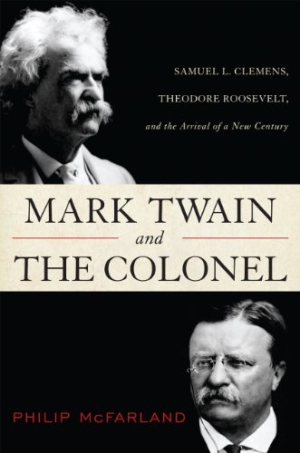Mark Twain and the Colonel
Samuel L. Clemens, Theodore Roosevelt, and the Arrival of a New Century
- 2012 INDIES Finalist
- Finalist, History (Adult Nonfiction)
No two men captured the zeitgeist of Gilded Age America more than Mark Twain, the cultural icon, and Theodore Roosevelt, the political one, claims the author in this dual biography and narrative history of 1890-1910. Although this was the age when America transitioned into an international power and industrialized nation, it was also the era when Reconstruction’s promise of civil rights for African Americans was overwhelmed by Jim Crow oppression.
McFarland, the author of two novels and five nonfiction works, including the most recent, Loves of Harriet Beecher Stowe, offers here a captivating investigation of the similarities and differences between Twain and Roosevelt presented against a backdrop of politics, imperialism, commercialism, and racism of these decades. The book begins with Twain’s return to America in 1900 after having lived abroad for ten years, the year in which the forty-two-year-old Roosevelt was soon to be elected vice president. Twain, twenty-three years older than Roosevelt, was a wealthy author of wildly popular travel accounts and novels and who would later become a harsh critic of President Roosevelt.
The author is especially adept at revealing the motivation for the men’s actions. More than any other issue, Twain was critical of Roosevelt’s foreign policy, which the writer viewed as empire-building in the Philippines, Cuba, and the Dominican Republic, inspiring him to call Roosevelt “the worst president in American history.” McFarland faults Twain for not recognizing Roosevelt’s important legislative triumphs in conservation, trust busting, and the Food and Drug Act.
Conversely, Roosevelt was an enthusiastic reader of Twain’s works. Both men loved the limelight and were in great demand as speakers during a time when public oration and readings were two of the most popular forms of entertainment. Twain and Roosevelt were loving husbands and fathers who endured the deaths of their wives and some of their children. These stories are retold by McFarland with sensitivity. Twain was greatly influenced by the nineteenth century while Roosevelt was a product of the emerging twentieth century. Perhaps this was the reason for the differences between the two most famous men of the Gilded Age.
General readers already familiar with Twain and Roosevelt or those who know little about either man will be fascinated by this illuminating, comparative biography/history that displays their significance to this tumultuous era.
Reviewed by
Karl Helicher
Disclosure: This article is not an endorsement, but a review. The publisher of this book provided free copies of the book to have their book reviewed by a professional reviewer. No fee was paid by the publisher for this review. Foreword Reviews only recommends books that we love. Foreword Magazine, Inc. is disclosing this in accordance with the Federal Trade Commission’s 16 CFR, Part 255.

